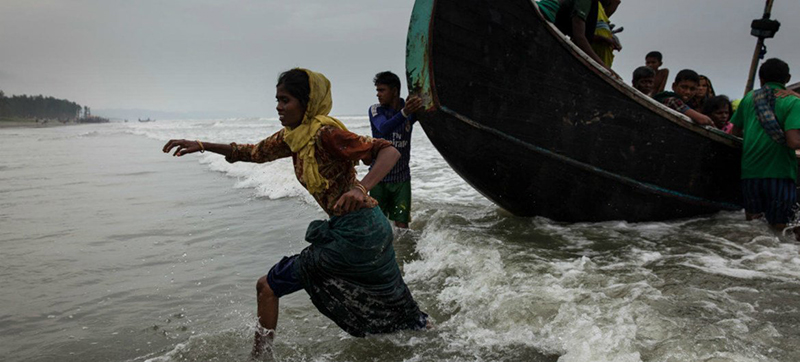Six years on, still no justice for Myanmar’s Rohingya

UN human rights chief Volker Türk, on Thursday, reiterated the call for accountability and justice for the hundreds of thousands of Rohingya driven from their homes in Myanmar by security forces in 2017, in what has been described as “textbook” ethnic cleansing.
Friday, 25 August, marks the sixth anniversary of the start of a massive offensive by Myanmar’s military against the mainly Muslim minority in Rakhine state.
Some 10,000 Rohingya men, women, children and newborns were killed, more than 300 villages burnt to the ground, and over 700,000 forced to flee to Bangladesh in search of safety, joining tens of thousands who fled earlier persecutions.
The then High Commissioner for Human Rights, Zeid Ra‘ad al-Hussein called the brutal campaign to drive the community from their homes a “textbook example of ethnic cleansing.”
In all, over a million Rohingya fled persecution and systematic discrimination to seek international refugee protection in Bangladesh, and approximately 600,000 remain within Rakhine state, where they continue to suffer severe rights restrictions and the threat of further violence.
In a sign of their desperation, thousands more continue to attempt dangerous sea crossings from Myanmar and Bangladesh, too often ending in tragedy.
A ‘most fervent wish’
In a statement Mr. Türk expressed his “most fervent wish” for the Rohingya to be able to return to their homes to live in safety, dignity, and freedom, as recognized citizens of Myanmar, with their human rights fully respected.
“This is currently not the case given the precarious conditions in Rakhine State. Furthermore, the military has shown no willingness to address systematic discrimination against the Rohingya.”
Renewing his call for accountability, the UN rights chief urged the international community to continue supporting Rohingya refugees and their host communities in Bangladesh, amid dwindling funds for humanitarian assistance programmes.
“More must be done to hold the military to account for their repeated campaigns of persecution against the Rohingya, and for driving the country into its current human rights and humanitarian crisis.
“In the face of the impunity enjoyed by the Myanmar military for past and present crimes against the Rohingya as well as other groups, I call on States fully to support the ongoing international accountability efforts.”
End ‘deadly paralysis of indifference’
Also on Thursday, Tom Andrews, the Special Rapporteur on the situation in Myanmar, appealed to world leaders to end a “deadly paralysis of indifference” and take action to hold accountable the architects and perpetrators of the violence.
“Responsibility for the immense suffering of the Rohingya starts at the top. Min Aung Hlaing, who led the genocidal campaign, is now at the head of an illegal and illegitimate military junta that is attacking civilian populations throughout Myanmar. He must be brought to justice and be made to answer for his crimes,” Mr. Andrews said.
The independent rights expert also chided the international community for failing its responsibilities to the Rohingya, noting that after six years, the Security Council has not referred the situation in Myanmar to the International Criminal Court (ICC), despite overwhelming evidence of atrocity crimes.
Rohingya tired of ‘empty promises’
Mr. Andrews underscored the need for tangible action.
“The Rohingya are tired of empty promises. Their children cannot eat political rhetoric or UN resolutions that go nowhere. They need and deserve the world to end the deadly paralysis of indifference.”
“We cannot let another year go by without principled and decisive action to support justice and accountability for the Rohingya.”
Independent human rights experts
Special Rapporteurs are independent human rights experts, appointed by the UN Human Rights Council as part of its Special Procedures.
They are mandated to monitor and report on specific thematic issues or country situations and work on a voluntary basis. They serve in their individual capacity; are not UN staff and do not receive a salary.



